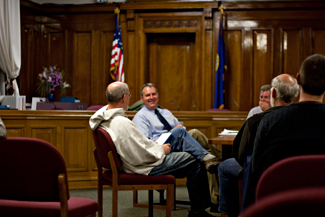The Moscow City Code does not address urban agriculture well, which is why the Planning and Zoning Commission is looking at ways to create an efficient and productive ordinance, said Mike Ray, Moscow city planner.

Ricky Scuderi | Argonaut
Moscow resident Mark Miller speaks with members of the Planning and Zoning Commission about urban agriculture guidelines within the city. On Thursday, the commission organized a second public input listening session Thursday to discuss current urban agriculture guidelines and how they could be improved.
He said out of the 19 districts in the city, only three of the districts address the use of agriculture.
“Agriculture is not explicitly permitted within 91 percent of the city,” he said.
Ray said on top of agriculture only being mentioned in three zones, in the Suburban Residential Zone it is only mentioned for the amount of animals people can have within the city.
He said because of this, the city wants to create an ordinance that addresses urban agriculture in a more detailed form.
Cinda Williams, the Latah County Extension Educator/Officer Chair, said Moscow is ahead of the times with this ordinance and is happy the city is taking the time to look at the rules surrounding urban agriculture.
Urban agriculture is the practice of cultivating, processing and distributing food in or around the city.
Ray said it can have many benefits, including giving people affordable healthy food along with food independence and security.
Moscow resident Steve Talbot said he agrees that urban gardening and agriculture is a great idea, but he said he had some safety concerns.
“I’m worried about sites along intersections being blocked by corn or sunflowers,” he said.
Talbot said he is also worried about people gardening along the tree lawn of area, and the potential for people tripping over pumpkins or other like-items while getting out of cars.
Ray said currently the ordinance mainly focuses on private property, and will most likely not look at the uses people can have with the tree lawns.
He said they also want to make sure the zoning codes coordinate with police regulations.
Hogs and pigs are not allowed in the city, and at most 25 rabbits can be kept on a property in city limits. Ray said they want to follow these regulations, along with making sure monetary regulations are followed as well.
The monetary regulations are a concern for some citizens, such as Mark Miller.
“I want to sell stuff as a hobbyist,” he said.
He said he didn’t sell enough eggs to be considered in the retail or market category, but also didn’t want to risk being in trouble because he sold something for a couple of dollars.
This is a common issue with people who have fruit trees, and have too much produce to eat, but not enough to sell large scale, and it was something they would have to consider, Ray said.
The city has been working on this ordinance since November 2012 and is still in the informal stage, he said.
“We are still fairly early in the process,” he said.
He said this is the time that input and discussion is needed, and the easiest time to incorporate the concerns of citizens into the ordinance.
Allison Griffith can be reached at [email protected]
